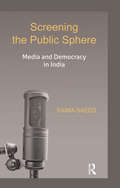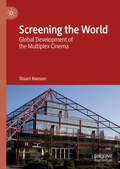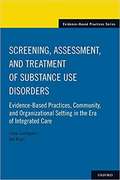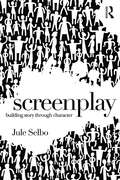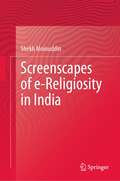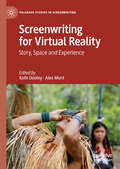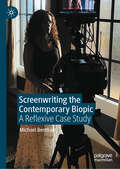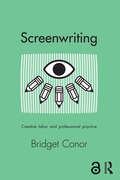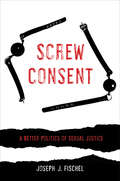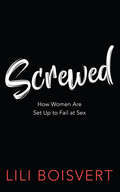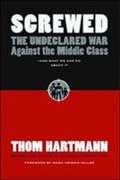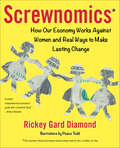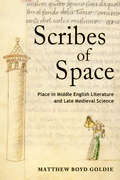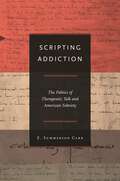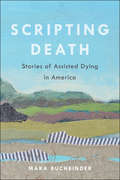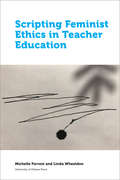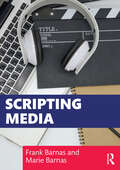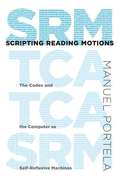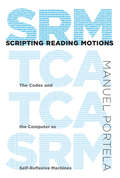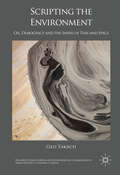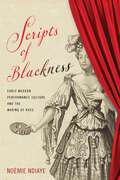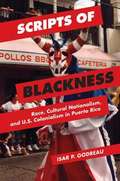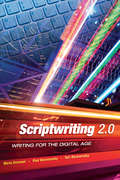- Table View
- List View
Screening the Public Sphere: Media and Democracy in India
by Saima SaeedFor centuries, democracy and development have steered the imagination of governments, citizens, intelligentsia and policymakers alike. Democracy without free media is a contradiction, while development without democracy is futile. Highlighting the power and significance of contemporary media, this book deconstructs news and news-making on Indian television. In exploring the concepts of ‘sense-making’ and ‘meaning-generation’, it examines how news and the dissemination of information and opinion influence the public sphere, participatory democracy, citizenship and civil society. Providing an original interpretation of the paradigmatic shifts in news content and newsroom practices, this book focuses on changing ownership patterns, increasing ‘entertainmentalization’ of news and the resultant ‘developmental reportage deficit’. At the same time, it confronts the uneasy and critical consequences of commercialization and rising sensationalism in news media. Finally, it discusses the role of Public Service Broadcasting, journalistic ethics, objectivity, and the politics of language and ideology in the media today, pointing to the need for greater diversity of content on the one hand and an emphasis on public interest in media policy-making, on the other. Drawing upon comprehensive empirical data, the democracy–media–development relationship is demonstrated through critical analyses of the media’s coverage of recent news events. This includes exhaustive content examination of news programmes on all major news channels of India, surveys with media experts and news professionals by way of questionnaires, and interviews with the audience to gauge the impact of media content on their understanding of social, political and economic issues. This volume will be especially useful to those in journalism, media and communication studies, as also to students of political science, sociology and economics.
Screening the World: Global Development of the Multiplex Cinema
by Stuart HansonThis book charts the development of the multiplex cinema as the pre-eminent form of film exhibition across the world. Going from its origins in the USA in the 1960s to its expansion overseas from the mid-1980s across Europe, Australia and other parts of Asia-Pacific, the book considers the emergence of a series of initially regional, then national and then international exhibition circuits. However, more than a consideration of US overseas expansion on the part of companies, this book examines the hegemony of the multiplex as a cultural and business form, arguing for its significance as a phenomenon that has transcended national and global boundaries and which has become the predominant venue for film viewing. Implicit in this analysis is a recognition of the domination of US media multi-nationals and Hollywood cinema, and the development of the multiplex cinema as symbolic of the extension and maintenance of the USA’s cultural and economic power. With case studies ranging from European countries such as Belgium, France, Germany and The Netherlands, to Pacific-Asian countries such as Australia, China, Japan and South Korea, this book is the first to explore the development of multiplexes on a global scale.
Screening, Assessment, And Treatment Of Substance Use Disorders: Evidence-based Practices, Community And Organizational Setting In The Era Of Integrated Care (Evidence-based Practices)
by Lena Lundgren Ivy KrullThere is a clear and pressing need for health professionals, including social workers, to be trained in evidence-based practices (EBPs) in the area of substance use disorders (SUD). The Substance Abuse and Mental Health Services Administration (SAMHSA) and other national organizations and government agencies have all put out reports calling for this vital need, though there remains a significant shortage of properly trained clinicians. The aim of this book is to provide an integrated perspective on addiction treatment on the evidence-base of psychosocial and medication-assisted treatment for substance use disorder. The volume is unique in that it critically examines the evidence base of both psychosocial and pharmacological treatment practices targeting a profession of social work audience. It is also one of few that (1) incorporates evidence both from the United States and internationally, and (2) presents a methodology that permits the authors to systematically review a large number of empirically based studies in an organized and easy-to-read manner. Additionally, the text incorporates a health disparities perspective and describes implementation barriers at the organizational, community, and policy levels. It can be used in policy, human behavior, and clinical practice both nationally and internationall
Screenplay: Building Story Through Character
by Jule SelboScreenplay: Building Story Through Character is designed to help screenwriters turn simple or intricate ideas into exciting, multidimensional film narratives with fully-realized characters. Based on Jule Selbo’s unique 11-step structure for building story through characters, the book teaches budding screenwriters the skills to focus and shape their ideas, turning them into stories filled with character development, strong plot elements based on obstacles and conflicts, and multifaceted emotional arcs. Using examples and analysis from classic and contemporary films across a range of genres, from The Godfather to Guardians of the Galaxy, Selbo’s Screenplay takes students inside the scriptwriting process, providing a broad overview for both beginners and seasoned writers alike. The book is rounded out with discussion questions, writing exercises, a guide to the business of screenwriting, in-depth film breakdowns, and a glossary of screenwriting terms.
Screenscapes of e-Religiosity in India
by Shekh MoinuddinThis book deals with three different subjects: geography, social media and religion equally to discuss e-religiosity in terms of screenscapes that shaped digital socialization processes wherein the role of digital devices in general and smartphones in particular are considered crucial and critical. The spatial dimension is the primary foundation of the book wherein both space and place are discussed in digital manifestations in spatial sense. Religiosity is discussed variably in a sense of spirituality, social theories, religions and images. The book uses some illustrations to understand image politics. Image politics is quintessential in the age of digital technologies when production and reproduction of images are not restricted to business only; rather it attracts politics too and politicians often use the same to make political scores against opponents. The book covers contemporary digital discourses of e-religiosity in a sense of screenscapes that often found pivot in daily discussions across social media platforms. Screenscapes are considered as mediated technologies when contents can be accessed from different social media apps to construct or deconstruct their views, narratives, discourses, ideas, emotions, and perceptions around religious images in day-to-day activities, practices, rituals, customs, traditions, faiths and beliefs. The used illustrations exclusively map Indian religious gestures, identities, values, and rituals in digital-spatial contexts. The book discusses seven major questions and argues the same across the chapters in varied representations and interpretations: How and to what extent has the meaning of religiosity changed in the digital age? What are the dimensions of e-religiosity in India? How are digital devices (re)shaping religiosity in terms of e-religiosity? How and to what extent digital devices are negotiating with social and cultural lives? What is digital spatiality? How and to what extent does social media influence religiosity?
Screenwriting for Virtual Reality: Story, Space and Experience (Palgrave Studies in Screenwriting)
by Kath Dooley Alex MuntThis book is focused on screenwriting and development for virtual reality (VR). It explores a diverse range of creative approaches to the writing and screen development of VR stories and immersive audience experiences. Contributions from scholars and practitioners combine conceptual and practically orientated approaches for creating fictional and documentary media VR stories. The book evaluates, challenges and adapts existing screenwriting models and practices for immersive storytelling and grapples with the future of storytelling in the era of sophisticated computer visualization, AI and the online social metaverse. The book proposes new VR storytelling models, identifies altered relationships between creators, screen works and their audiences and demonstrates how interdisciplinary practices will be core to the future of screen storytelling.
Screenwriting the Contemporary Biopic: A Reflexive Case Study
by Michael BenthamThis book explores the intricate challenges screenwriters face when balancing fact and fiction in biopics. As biopics have become synonymous with prestige and award-worthiness in contemporary cinema, they also attract intense scrutiny for their handling of historical facts. The allure of the biopic lies in its ability to use fiction to delve into the interiority of its subjects, yet this raises ethical questions about historical fidelity and narrative truth. What obligations does the phrase "based on a true story" impose on screenwriters? Can a biopic truly capture the essence of its subject, or does it inherently distort reality? Through a self-reflexive case study of a screenplay about British boxer Randolph Turpin, this book seeks to answer these pressing questions. It examines the process of transforming extensive research into a compelling narrative, offering insights into the delicate balance between truth and fiction. By bridging the gap between theory and practice, this work provides a fresh perspective on the biopic genre. Ideal for scholars in screenwriting and film studies, industry professionals, and students of screen production, this book offers a deeper understanding of how biopics reveal truths about historical figures and events.
Screenwriting: Creative Labor and Professional Practice
by Bridget ConorScreenwriting: Creative Labor and Professional Practice analyzes the histories, practices, identities and subjects which form and shape the daily working lives of screenwriters. Author Bridget Conor considers the ways in which contemporary screenwriters navigate and make sense of the labor markets in which they are immersed. Chapters explore areas including: Screenwriting histories and myths of the profession Screenwriting as creative labor Screenwriters’ working lives Screenwriting work and the how-to genre Screenwriting work and inequalities Drawing on historical and critical perspectives of mainstream screenwriting in the USA and UK, as well as valuable interviews with working screenwriters, this book presents a highly original and multi-faceted study of screenwriting as creative labor and professional practice.
Screw Consent: A Better Politics of Sexual Justice
by Joseph J. FischelWhen we talk about sex—whether great, good, bad, or unlawful—we often turn to consent as both our erotic and moral savior. We ask questions like, What counts as sexual consent? How do we teach consent to impressionable youth, potential predators, and victims? How can we make consent sexy? What if these are all the wrong questions? What if our preoccupation with consent is hindering a safer and better sexual culture? By foregrounding sex on the social margins (bestial, necrophilic, cannibalistic, and other atypical practices), Screw Consent shows how a sexual politics focused on consent can often obscure, rather than clarify, what is wrong about wrongful sex. Joseph J. Fischel argues that the consent paradigm, while necessary for effective sexual assault law, diminishes and perverts our ideas about desire, pleasure, and injury. In addition to the criticisms against consent leveled by feminist theorists of earlier generations, Fischel elevates three more: consent is insufficient, inapposite, and riddled with scope contradictions for regulating and imagining sex. Fischel proposes instead that sexual justice turns more productively on concepts of sexual autonomy and access. Clever, witty, and adeptly researched, Screw Consent promises to change how we understand consent, sexuality, and law in the United States today.
Screwed: How Women Are Set Up to Fail at Sex
by Lili BoisvertWhen it comes to sex and desire, women are screwed. In film, on the page, in fashion, and in everyday life, women’s desire is routinely shown as subordinate to men’s — when it isn’t suppressed altogether. Lili Boisvert argues that there is one dominant principle behind heterosexual encounters: that desire is a male phenomenon and women are merely its object. To change this alienating system, she contends, we must start by facing it head-on. From clothing to flirting, from our fascination with youth and innocence to the orgasm gap, every aspect of women’s lives is dictated by their status as sex objects. Is it any wonder that they are feeling sexually unfulfilled? In a series of explorations of what desire looks like under patriarchy, Screwed sketches the contours of what could be true sexual liberation for women, inside — and outside — the bedroom.
Screwed: The Undeclared War Against the Middle Class and What We Can Do About It
by Thom Hartmann(From the book cover) The War Is On: Fight for Your Democratic Birthright The American middle class is on its deathbed. Ordinary folks who put in a solid day's work can no longer afford to buy a house, send their kids to college, or even get sick. If you're not a CEO, you're probably screwed. Air America host Thom Hartmann shows how the American middle class that was so carefully constructed by our country's founding fathers has been systematically dismantled over the past quarter-century, and, under the guise of "freeing" the market, replaced by a system designed to line the pockets of the super-rich and corporations. Hartmann shows that it's not too late to return to the America our founders envisioned. Democracy requires a fair playing field. It will survive only if We the People stand up, speak out, and reclaim our democratic birthright.
Screwnomics: How Our Economy Works Against Women and Real Ways to Make Lasting Change
by Rickey Gard DiamondThe personal is not only political, it’s also economic and sexual: as a society, we’re encouraged to view economics as objective science far removed from us—when in reality it has concrete and far-reaching effects on our everyday lives. In Screwnomics, Rickey Gard Diamond shares personal stories, cartoons, and easy-to-understand economic definitions in her quest to explain the unspoken assumptions of 300 years of EconoMansplaining—the economic theory that women should always work for less, or better for free. It unpacks economic definitions, turns a men-only history on its head, and highlights female experiences and solutions. encouraging female readers to think about their own economic memoir and confront our system’s hyper-masculine identity. In the past fifty years, the US has witnessed a major shift in economic theory, and yet few women can identify or talk about its influence in their own lives. Accessible and inspiring, Screwnomics offers female readers hope for a better, more inclusive future—and the tools to make that hope a reality.
Scribble Scribble: Notes on the Media
by Nora EphronAddresses, essays and lectures by Ephron on mass media today.
Scribes of Space: Place in Middle English Literature and Late Medieval Science
by Matthew Boyd GoldieScribes of Space posits that the conception of space—the everyday physical areas we perceive and through which we move—underwent critical transformations between the thirteenth and fifteenth centuries. Matthew Boyd Goldie examines how natural philosophers, theologians, poets, and other thinkers in late medieval Britain altered the ideas about geographical space they inherited from the ancient world. In tracing the causes and nature of these developments, and how geographical space was consequently understood, Goldie focuses on the intersection of medieval science, theology, and literature, deftly bringing a wide range of writings—scientific works by Nicole Oresme, Jean Buridan, the Merton School of Oxford Calculators, and Thomas Bradwardine; spiritual, poetic, and travel writings by John Lydgate, Robert Henryson, Margery Kempe, the Mandeville author, and Geoffrey Chaucer—into conversation. This pairing of physics and literature uncovers how the understanding of spatial boundaries, locality, elevation, motion, and proximity shifted across time, signaling the emergence of a new spatial imagination during this era.
Scripting Addiction: The Politics of Therapeutic Talk and American Sobriety
by E. Summerson CarrGaming the language of addiction treatmentScripting Addiction takes readers into the highly ritualized world of mainstream American addiction treatment. It is a world where clinical practitioners evaluate how drug users speak about themselves and their problems, and where the ideal of "healthy" talk is explicitly promoted, carefully monitored, and identified as the primary sign of therapeutic progress. The book explores the puzzling question: why do addiction counselors dedicate themselves to reconciling drug users' relationship to language in order to reconfigure their relationship to drugs?To answer this question, anthropologist Summerson Carr traces the charged interactions between counselors, clients, and case managers at "Fresh Beginnings," an addiction treatment program for homeless women in the midwestern United States. She shows that shelter, food, and even the custody of children hang in the balance of everyday therapeutic exchanges, such as clinical assessments, individual therapy sessions, and self-help meetings. Acutely aware of the high stakes of self-representation, experienced clients analyze and learn to effectively perform prescribed ways of speaking, a mimetic practice they call "flipping the script."As a clinical ethnography, Scripting Addiction examines how decades of clinical theorizing about addiction, language, self-knowledge, and sobriety is manifested in interactions between counselors and clients. As an ethnography of the contemporary United States, the book demonstrates the complex cultural roots of the powerful clinical ideas that shape therapeutic transactions—and by extension administrative routines and institutional dynamics—at sites such as "Fresh Beginnings."
Scripting Death: Stories of Assisted Dying in America (California Series in Public Anthropology #50)
by Mara BuchbinderHow the legalization of assisted dying is changing our lives. Over the past five years, medical aid-in-dying (also known as assisted suicide) has expanded rapidly in the United States and is now legally available to one in five Americans. This growing social and political movement heralds the possibility of a new era of choice in dying. Yet very little is publicly known about how medical aid-in-dying laws affect ordinary citizens once they are put into practice. Sociological studies of new health policies have repeatedly demonstrated that the realities often fall short of advocacy visions, raising questions about how much choice and control aid-in-dying actually affords. Scripting Death chronicles two years of ethnographic research documenting the implementation of Vermont’s 2013 Patient Choice and Control at End of Life Act. Author Mara Buchbinder weaves together stories collected from patients, caregivers, health care providers, activists, and legislators to illustrate how they navigate aid-in-dying as a new medical frontier in the aftermath of legalization. Scripting Death explains how medical aid-in-dying works, what motivates people to pursue it, and ultimately, why upholding the "right to die" is very different from ensuring access to this life-ending procedure. This unprecedented, in-depth account uses the case of assisted death as an entry point into ongoing cultural conversations about the changing landscape of death and dying in the United States.
Scripting Feminist Ethics in Teacher Education (Education)
by Michelle Forrest Linda WheeldonWhat is the value and place of feminist teaching in common schooling and teacher education? In an open style of writing in philosophy of education, the authors combine original dramatized case studies and allegorical, first-person narratives to analyze key concepts for teachers in relation to radical feminist consciousness-raising. They examine values relativism as antithetical to “good” teaching; the history and practice of feminist consciousness-raising as corrective to the dominant model of moral deliberation in professional ethics; youth cyber-bullying as an example of Italian feminist philosopher Adriana Caverero’s claim that ‘horror is the face of woman;’ and the value of paradox, contradiction and myth in counter-balancing material-realist certainty in teaching, research, and policy-making in public education. Supplements to the five chapters offer additional ideas for introducing feminist teaching practices, through discussion and performance, into professional ethics for pre- and in-service teacher education. This book is published in English. - Dans un style original et fascinant, les auteures jettent la lumière sur l’histoire, le processus et la valeur de la sensibilisation radicale au féminisme à l’intention des formateurs en enseignement et des enseignants féministes. Elles se penchent sur de graves incidents qui se déroulent de nos jours dans les salles de classe. Caractérisés par le relativisme des valeurs, les jugements précipités, la constatation de vulnérabilité, la cyberintimidation et le besoin de contrer le déterminisme dans l’éducation des enseignants et dans la recherche, ces incidents sont analysés à partir de concepts clés formulés par des philosophes et des théoriciens féministes. Mariant récits personnels, dramatisation, allusions littéraires et reconstructions philosophiques, les auteures formulent des analyses et remettent en question la place de l’aspect personnel dans la responsabilité éthique de l’enseignant en matière de délibérations morales dans des classes pluralistes. Ce livre pourra intéresser les éducateurs qui aident les enseignants en formation à développer les capacités et la sensibilité nécessaires pour assumer l’autorité qui leur revient en classe. Les questions éthiques qui sont soulevées ont aussi des répercussions sur l’enseignement de l’éthique professionnelle dans d’autres disciplines axées sur le travail social. Cette oeuvre unique va au coeur des pires craintes et présomptions des enseignants, et propose une nouvelle approche visant l’analyse des études de cas en philosophie de l’éducation. Ce livre est publié en anglais.
Scripting Media
by Frank Barnas Marie BarnasBringing together professional standards, practices, and jargon from across the industry, Scripting Media provides a complete overview of writing for divergent forms of media. While some forms of media writing have been honed and standardized over generations, others demand new ways of thinking and collaborating. Covering traditional forms of scriptwriting, such as news, advertising, and film scripting, as well as newer and more emerging areas of social media and virtual reality, this book is designed to prepare readers for the varying formats, styles, and techniques specific to each medium. Each chapter contains a list of key terms, an historical overview of the area, and technical specifications for students to be aware of. Exercises, essay prompts, and online links help reinforce students’ knowledge and provide avenues for private study. Written in an accessible and engaging style by two renowned media practitioners, authors, and teachers, Scripting Media is essential reading for students approaching media writing for the first time.
Scripting Media
by Frank Barnas Marie BarnasBringing together professional standards, practices, and jargon from across the industry, Scripting Media provides a complete overview of writing for divergent forms of media.While some forms of media writing have been honed and standardized over generations, others demand new ways of thinking and collaborating. Covering traditional forms of scriptwriting, such as news, advertising, and film scripting, as well as newer and more emerging areas of social media and virtual reality, this book is designed to prepare readers for the varying formats, styles, and techniques specific to each medium. Each chapter contains a list of key terms, an historical overview of the area, and technical specifications for students to be aware of. Exercises, essay prompts, and online links help reinforce students’ knowledge and provide avenues for private study.Written in an accessible and engaging style by two renowned media practitioners, authors, and teachers, Scripting Media is essential reading for students approaching media writing for the first time.
Scripting Reading Motions: The Codex and the Computer as Self-Reflexive Machines
by Manuel PortelaIn Scripting Reading Motions, Manuel Portela explores theexpressive use of book forms and programmable media in experimental works of both print andelectronic literature and finds a self-conscious play with the dynamics of reading and writing. Portela examines a series of print and digital works by Johanna Drucker, Mark Z. Danielewski, RuiTorres, Jim Andrews, and others, for the insights they yield about the semiotic and interpretiveactions through which readers produce meaning when interacting with codes. Analyzing these works asembodiments and simulations of the motions of reading, Portela pays particular attention to the waysin which awareness of eye movements and haptic interactions in both print and electronic media feedsback onto the material and semantic layers of the works. These feedbacks, he argues, sustainself-reflexive loops that link the body of the reader to the embodied work. Readers' haptic actionsand eye movements coinstantiate the object that they are reading. Porteladiscusses typographic and graphic marks as choreographic notations for reading movements; examinesdigital recreations of experimental print literary artifacts; considers reading motions in kineticand generated texts; analyzes the relationship of bibliographic, linguistic, and narrative coding inDanielewski's novel-poem, Only Revolutions; and describes emergent meanings ininteractive textual instruments. The expressive use of print and programmable media, Portela shows,offers a powerful model of the semiotic, interpretive, and affective operations embodied in readingprocesses.
Scripting Reading Motions: The Codex and the Computer as Self-Reflexive Machines (The\mit Press Ser.)
by Manuel PortelaAn exploration of what experimental literature in both print and programmable media tells us about the act of reading.In Scripting Reading Motions, Manuel Portela explores the expressive use of book forms and programmable media in experimental works of both print and electronic literature and finds a self-conscious play with the dynamics of reading and writing. Portela examines a series of print and digital works by Johanna Drucker, Mark Z. Danielewski, Rui Torres, Jim Andrews, and others, for the insights they yield about the semiotic and interpretive actions through which readers produce meaning when interacting with codes. Analyzing these works as embodiments and simulations of the motions of reading, Portela pays particular attention to the ways in which awareness of eye movements and haptic interactions in both print and electronic media feeds back onto the material and semantic layers of the works. These feedbacks, he argues, sustain self-reflexive loops that link the body of the reader to the embodied work. Readers' haptic actions and eye movements coinstantiate the object that they are reading.Portela discusses typographic and graphic marks as choreographic notations for reading movements; examines digital recreations of experimental print literary artifacts; considers reading motions in kinetic and generated texts; analyzes the relationship of bibliographic, linguistic, and narrative coding in Danielewski's novel-poem, Only Revolutions; and describes emergent meanings in interactive textual instruments. The expressive use of print and programmable media, Portela shows, offers a powerful model of the semiotic, interpretive, and affective operations embodied in reading processes.Important Notice: The digital edition of this book is missing some of the images found in the physical edition.
Scripting the Environment: Oil, Democracy and the Sands of Time and Space (Palgrave Studies in Media and Environmental Communication)
by Geo TakachThis volume explores how to engage audiences both beyond and within the academy more deeply in environmental research through arts-based forms. It builds on a multi-pronged case study of scripts for documentary film, audio-visual and stage formats, focusing on how the identity of a place is constructed and contested in the face of environmental concerns around fossil-fuel extraction in a globalized, visual society--and specifically on the rising, international public-relations war over Alberta’s stewardship of the tar sands. Each script is followed by discussion of the author’s choices of initiating idea, research sources, format, voices, world of the story, structure and visual style, and other notes on the convergence of synthesis, analysis and (re)presentation in the script. Included are lively analysis and commentary on screenwriting and playwriting theory, the creation and dissemination of the scripts, and reflections to ground a proposed framework for writing eco-themed scripts for screen, audio-visual and stage formats.
Scripts of Blackness: Early Modern Performance Culture and the Making of Race (RaceB4Race: Critical Race Studies of the Premodern)
by Noémie NdiayeScripts of Blackness shows how the early modern mass media of theatre and performance culture at-large helped turn blackness into a racial category, that is, into a type of difference justifying emerging social hierarchies and power relations in a new world order driven by colonialism and capitalism.In this book, Noémie Ndiaye explores the techniques of impersonation used by white performers to represent Afro-diasporic people in England, France, and Spain in the sixteenth and seventeenth centuries, using a comparative and transnational framework. She reconstructs three specific performance techniques—black-up (cosmetic blackness), blackspeak (acoustic blackness), and black dances (kinetic blackness)—in order to map out the poetics of those techniques, and track a number of metaphorical strains that early modern playtexts regularly associated with them. Those metaphorical strains, the titular scripts of blackness of this book, operated across national borders and constituted resources, as they provided spectators and participants with new ways of thinking about the Afro-diasporic people who lived or could/would ultimately live in their midst.Those scripts were often gendered and hinged on notions of demonization, exclusion, exploitation, animalization, commodification, sexualization, consensual enslavement, misogynoir, infantilization, and evocative association with other racialized minorities. Scripts of Blackness attempts to grasp the stories that Western Europeans told themselves through performative blackness, and the effects of those fictions on early modern Afro-diasporic subjects.
Scripts of Blackness: Race, Cultural Nationalism, and U.S. Colonialism in Puerto Rico
by Isar P GodreauThe geopolitical influence of the United States informs the processes of racialization in Puerto Rico, including the construction of black places. In Scripts of Blackness, Isar P. Godreau explores how Puerto Rican national discourses about race--created to overcome U.S. colonial power--simultaneously privilege whiteness, typecast blackness, and silence charges of racism. Based on an ethnographic study of the barrio of San Antón in the city of Ponce, Scripts of Blackness examines institutional and local representations of blackness as developing from a power-laden process that is inherently selective and political, not neutral or natural. Godreau traces the presumed benevolence or triviality of slavery in Puerto Rico, the favoring of a Spanish colonial whiteness (under a hispanophile discourse), and the insistence on a harmonious race mixture as discourses that thrive on a presumed contrast with the United States that also characterize Puerto Rico as morally superior. In so doing, she outlines the debates, social hierarchies, and colonial discourses that inform the racialization of San Antón and its residents as black. Mining ethnographic materials and anthropological and historical research, Scripts of Blackness provides powerful insights into the critical political, economic, and historical context behind the strategic deployment of blackness, whiteness, and racial mixture.
Scriptwriting 2.0: Writing for the Digital Age
by Marie DrennanOnline media is and will continue to be at the forefront of entertainment; this book introduces readers to this new world and helps them create good content for it. It is a compact, practical guide for those who want to explore scriptwriting for the digital age while also learning essential skills and techniques central to new media writing. Scriptwriting 2.0 contains advice on writing both short- and long-form webisodes as part of a series, as well as standalone pieces. It then goes beyond the writing process to discuss revising, production, promotion and copyright. It is written in a friendly, readable and jargon-free style and includes real-world examples from successful series and a sample script. Readers can access full episodes of the two series discussed at length as well as samples from several other web series.
